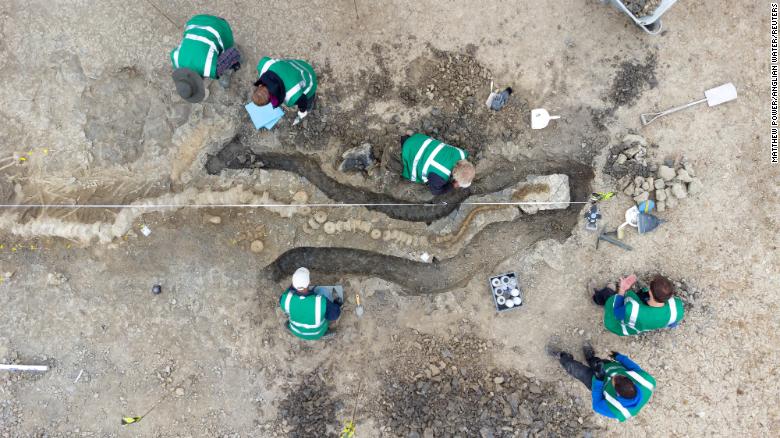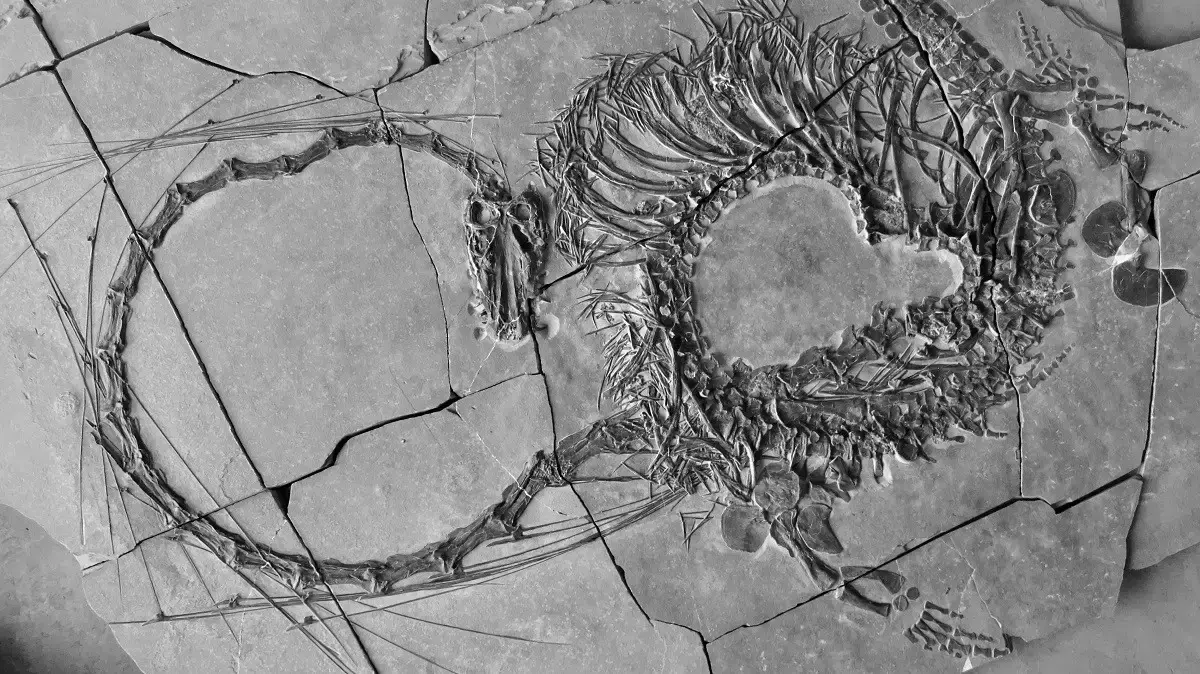They find fossils of the dinosaur known as "duckbill" 1:27
(CNN) -
The colossal fossilized remains of a 180-million-year-old ichthyosaur - colloquially known as a "sea dragon" - were found in the UK in what researchers called one of the most important discoveries of the world. region.
Discovered in a reservoir in the county of Rutland, in the East Midlands region of England, the specimen is the largest and most complete ichthyosaur fossil ever found in the United Kingdom, measuring almost 10 meters long and its skull weighing a ton.
It is also believed to be the first of its kind -
Temnodontosaurus trigonodon
- to be found in the United Kingdom.
Ichthyosaurs, marine reptiles that lived alongside dinosaurs, resembled dolphins in their body shape.
They became extinct about 90 million years ago, after appearing for the first time 250 million years ago.
Shocking spider, insect and fish fossils tell the story of Australia's origins
When and how did they find the "sea dragon"?
This ichthyosaur was discovered in February last year in the Rutland Water Nature Reserve.
This was done by the task force of Joe Davis, head of the conservation team for the Leicestershire and Rutland Wildlife Trust, which manages the nature reserve in collaboration with owner Anglian Water.
advertising
Paleontologists work on the excavation of the ichthyosaur fossil in August 2021.
Davis was doing routine re-planning work, which involved draining the water from the lagoon, when he saw parts of vertebrae sticking out of the mud, the Leicestershire and Rutland Wildlife Trust reported in a press release.
This was followed by a large-scale excavation in August and September by a team of paleontologists led by Dean Lomax, an ichthyosaur expert and current visiting scientist at the University of Manchester.
"The size and the completeness together is what makes it truly exceptional," Lomax told CNN, adding that previous ichthyosaur findings in the UK had not been "anywhere near as complete and as large as this one."
At the top of the food chain
Lomax said it was the most complete large specimen - which he classified as 10 or more meters in length - found anywhere in the world.
He noted that it was "a really fantastic discovery" as well as, for him, "a true milestone in his career."
"This was a predator from the top of the food chain, the apex," he told CNN of the discovery.
"So this one would have been dining with other ichthyosaurs, it would have been eating big fish, it would have eaten, if it could catch them, squid too."
However, Lomax indicated that the discovery was the "tip of the iceberg", as there is much to discover from the specimen once the pieces of rock have been removed, with the possibility that the last meal of the ichthyosaur has been preserved or even that the reptile could be pregnant.
"It was mind-blowing," Anglian Water spokeswoman Regan Harris told CNN.
"I mean, you kind of couldn't believe what you saw when you had it in front of you. But yeah, amazing."
Harris, who was at the excavation, said that smaller ichthyosaurs had previously been found at the Rutland Water site, but that the "large scale" and "well-preserved" nature of this particular discovery made it unique.
Unique Image: Intact Dinosaur Embryo Fossil 1:03
"Probably one of the largest fossil reptiles ever found"
Paul Barrett, Researcher in the department of Vertebrate Paleobiology and Anthropology at the Natural History Museum in London, said that the Rutland ichthyosaur was "probably one of the largest fossil reptiles ever found, including dinosaurs."
Barrett was not involved in the find.
"It really is an impressive and spectacular object," Barrett told CNN.
"It certainly is one of the UK's most impressive marine fossil discoveries that I can remember, at least in the last 20 or 30 years or so."
Barrett, whose work has spanned dinosaurs and other extinct reptiles, including ichthyosaurs, said the find confirmed the "cosmopolitanism" of the species, which until now was mainly known in Germany.
This "sea dragon", an unusual find
The specimen is being treated by a paleontological conservation specialist, in a process that will last between 12 and 18 months.
After this, Harris said, the goal will be to put it on public display.
"We are very proud of this, and I know the local community is too," he told CNN.
"We really want to bring it home to Rutland and have it on display for people to enjoy."
For Lomax, the lead researcher, one of the hopes is to explore the Rutland Water site further, as six or seven vertebrae from other ichthyosaurs were also discovered during the excavation.
He said that he had not been overlooked that "fortuitous things have happened to arrive at this find."
"It's honestly incredibly unusual," Lomax told CNN.
"Avid fossil hunters or paleontologists can search their entire careers and never find something like this, even when you know where you are looking."
sea dragon fossil




